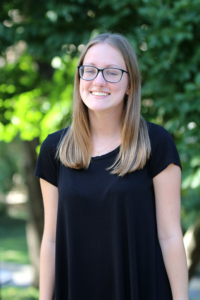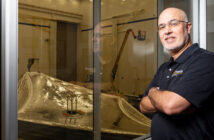I’m a good reporter, but I’m not a good writer.

Samantha Tomaszewski
When I tell people I want to be a journalist, they assume I’m some amazing writer who spends her spare time reading the dictionary and outlining the next great American novel.
No — I’ll try to explain sometimes — I want to be a journalist because I like information. I like knowing what’s going on in the world. Words are just one of the many ways said information is transmitted.
The problem with this, besides it completely discounting the merits of GIF-based journalism, is that the lens through which the field of journalism is viewed by the public is becoming increasingly narrow.
Sure, there’s something to be said for a well-written piece. You want it to be interesting enough for people to want to keep reading. But the driving force is the story behind it. It’s not fiction — without the truth, there would be no reason for the words, as well-composed as they may be.
A 2016 Gallup poll determined that Americans’ trust and confidence in the mass media “to report the news fully, accurately and fairly” has dropped to its lowest level in Gallup polling history. Thirty-two percent of respondents said they have a great deal or fair amount of trust in the media, down eight percentage points from last year.
There needs to be a return to focusing on the information and the substance of reporting. Especially in the mainstream media, leaving things like magazines aside, the emphasis needs to be on getting things right and making things clear, as opposed to artful language.
Obviously a marriage of the two can exist, which is ideal. The best we can achieve as journalists to is write a story accurately, and make it interesting to boot. But for now, we need be reporters first, and writers second.
And this is not to say that there aren’t going to be mistakes and bumps in the road along the way. The pursuit of truth is a difficult task, but one that you undertake when deciding to report. It is an unwavering goal that should follow each journalist throughout his or her career.
The first principle of the Society of Professional Journalist’s code of ethics is “seek truth and report it.” The principle reads: Ethical journalism should be accurate and fair. Journalists should be honest and courageous in gathering, reporting and interpreting information.
And yet, we’re living in a society where a member of Donald Trump’s transition team was fired because he spread a fake news story about Hillary Clinton via Twitter.
We’re living in a media climate where the top-performing fake election news stories on Facebook generated more engagement than the top stories from major news outlets.
These checks on the government are important in a functioning democracy, something we have that we should appreciate. But I do believe the burden lies on the consumers to educate themselves and parse the truth from the lies.
Especially during an election, voters have a responsibility to be informed. It is not the job of a journalist to shove information into the faces of their readers and force them to read it. But it makes things a little easier if what’s out there in the first place is reputable and accurate.
This is not to say that it’s easy. Over the past four years of my journalism education, I’ve often questioned what the role of a journalist is supposed to be. And there’s not simply one correct answer. But to me, it’s finding the truth.
Especially at a private school like Lehigh, we face a multitude of roadblocks. We wear multiple hats — some days we’re a journalist, others we are a student in a classroom. We have to bridge the gap between personal and professional, and sometimes it’s blurred. But this is never a reason to quit.
I’ve failed before, and I will many more times throughout my career, but having this guiding principle is important to staying driven and keeping a clear head.
Sometimes people are not going to want to talk to you. Sometimes people are going to tell you you’re wrong. Sometimes people will do everything they can to get in your way. Being a journalist is about being tenacious and being able to question authority, even in the face of adversity.
Our job is to find the truth, no matter how difficult it may be.
_
Samantha Tomaszewski, ’17, is the editor in chief of The Brown and White. She can be reached at [email protected].





Comment policy
Comments posted to The Brown and White website are reviewed by a moderator before being approved. Incendiary speech or harassing language, including comments targeted at individuals, may be deemed unacceptable and not published. Spam and other soliciting will also be declined.
The Brown and White also reserves the right to not publish entirely anonymous comments.